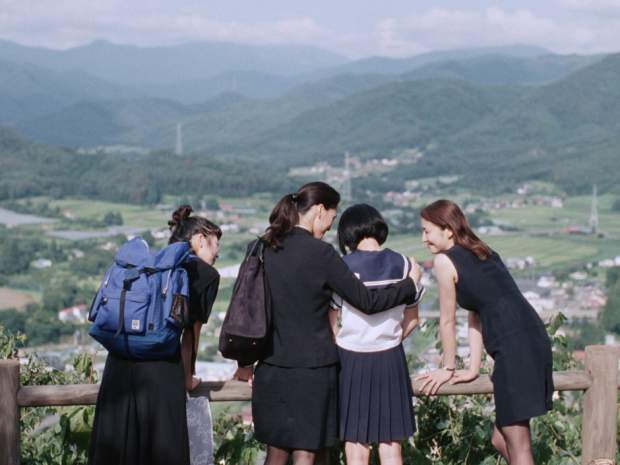Japanese director Hirokazu Kore-eda offers his usual family melodrama with Our Little Sister, but the focus this time is on sisterly bonds, and the family unit is atypical: dad left many years ago to start a new life, and mom couldn’t handle raising three children on her own. Eldest sister Sachi (Haruka Ayase) has played the role of “mom” ever since their grandmother passed away, and continues to do so, despite the fact that her younger siblings are now adults.
There’s Yoshino (Masami Nagasawa), a polished young woman whose career ambitions are tragically aligned with her romantic interests; when her relationships dissolve she gets hopelessly drunk, and seeks new employment. There’s also 19-year-old Chika (Kaho), whose unbrushed curly hair, androgynous fashion and wide-eyed naiveté make her look younger than she is.
But it’s 14-year-old Suzu (Suzu Asano) – whom the Koda sisters meet for the first time at their father’s funeral – who plays the eponymous little sister, and whose newfound presence in the Koda sisters’ lives forms the crux of the film.
It’s an awkward meeting; after all, their father ran away with his second wife to have Suzu. But when the three women learn the timid, well-behaved and now-orphaned Suzu had been their dad’s sole caretaker during his illness, the empathetic Sachi invites her to live with them – so Suzu can have a proper childhood, something the oldest sibling also never got to experience.
After this serendipitous meeting, the film dovetails into a series of soft character arcs for each sister, all the while underscoring Suzu’s positive influence in the household. For Sachi, that includes a promotion to head the new palliative care ward where she works, while Chika’s subplot, involving her boyfriend’s desire to climb more mountains being quelled by toe injuries from previous expeditions, is so slight and comical it barely seems to qualify as an arc at all.
Suzu’s storyline is the most complex, and centres around her ambivalence toward their father’s death – her newfound respite from adult responsibility conflicted by the loss of a parent. It’s only when she accidentally gets drunk on the sisters’ homemade plum wine – a family tradition passed down from their grandmother – that a hot spring of rage bursts from within.
The film balances the chaos of life with the stability of surroundings: their beautiful, old-fashioned family home, and their hospitable town of Kamakura. Suzu receives a warm welcome as she becomes a helpful teammate in the school’s soccer team and a fixture at a diner owned by a family friend. This sort of female-oriented exuberance makes Our Little Sister like a Japanese Gilmore Girls: the diner is Luke’s; Kamakura is Stars Hollow, and the older sisters form a composite of Lorelai.
The film, however, is even more obsessed with food than that series. Whether it’s a rambunctious, well-deserved meal at the diner post-soccer game, the seasonal plucking of plums from the family tree, or Suzu bringing home freshly caught whitebait for her sisters, Kore-eda uses food as more than just a narrative device to gather characters around a dinner table. It also lets the sisters create and relive family memories. The repeated presence of food anchors not only the characters, but the film as well, and tempers the film’s narrative problems – like its unnecessary subplots and its occasionally overly sentimental tone.
Our Little Sister does best in small, quiet moments, like a scene in which Sachi gifts her mother – with whom she has a rocky relationship – the last of her grandmother’s plum wine. Scenes like this prove to be emotionally satiating, but don’t be surprised if you leave the theatre hungry for some Japanese food.

